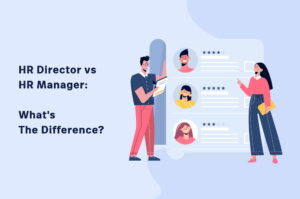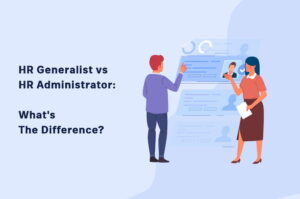An HR technology consultant helps companies implement new technology and tools relevant to their human resources department, such as HRIS. The consultant also helps assess whether the company needs any changes in the first place. Finally, an experienced professional can also help automate HR procedures such as hiring, payroll management, legal compliance, employee relations, etc.
Even an experienced HR professional will undergo a robust HRIS implementation only once or twice in their career. Since not many HR employees focus on how the technology works, companies hire a single advisor or a consulting firm to help with strategic planning.
Larger organizations, especially, can struggle to integrate a new system. Since the integration shouldn’t hinder daily HR tasks, consultants offer innovative solutions and support.
This article provides all the information about what an HR technology consultant does, the required skills, and duties. Let’s start.
What Exactly Does an HR Technology Consultant Do?
Larger companies have a dedicated HR technology team. Technology consultants work on overseeing systems, business processes, and technology capabilities related to HR. The daily work focuses on process definition, ways to improve the existing systems, necessary support, and figuring out the most optimal practices.
Businesses that can’t afford such a team typically hire a one-time HR consultant to help with the overall technical design and improvements to meet their business needs. An enterprise might employ a subject matter expert to help with specific tech development.
Here’s everything an HR tech consultant might do:
Assess Technology Capabilities & Needs
About 74% of businesses in the US actively plan to increase their HR technology budget.
However, while every HR department needs HRIS to help meet primary human resources needs, introducing new software won’t necessarily solve the issue.
A tech consultant will help assess whether new technology is worth investing in and whether the solution lies elsewhere. Tech consultants have an equivalent combination of tech and HR skills. As such, they can provide valuable insight into technology and general employee relations.
They also interview stakeholders and pinpoint solutions such as human capital management software to assess the following:
- Employees that use the technology – What roles and positions do the employees that use services hold? Are they HR managers, recruiters, or payroll specialists?
- Solution usage – How do employees use the solution? Are there any issues? How does the solution impact the business’s efficiency?
- Technology assessment – Are there better alternatives? Is the current solution implemented correctly? Does it have all the features and the latest updates?
It’s possible that a company doesn’t need a new system but an update to the current one. In that case, the consultant can save business teams money and time.
Provide High-Level Understanding
Tech consultants can’t immediately integrate solutions. A professional will discuss the problem with stakeholders and ensure they understand it. More importantly, the advisor will aim to align with expectations.
A technology requirement doesn’t mean the company has the resources to afford such services and programs. Before proceeding to the integration process, the consultant must present solutions and costs. Otherwise, they risk starting something the organization can’t afford.
Companies often don’t understand what implementing a human resources tech solution requires. The consultant’s job is to assess the requirements while adding consulting on implementation, costs, and time needed for the client to reap the benefits of the technology.
Provide Innovative Solutions
If a business chooses specific HR tools, it will expect the HR consultant to help determine the right vendor. By this point, the tech consultant should know the right solution.
One business may want to automate general supervision or HR policy overview, while another may want to improve employee experience. For every goal or set of goals, the consultant needs to provide the best solution possible.
When deciding on the vendor, here are the required steps:
- Create an RFP – The consultant should know how to write an effective request for a proposal. This way, the consultant gets a clear idea of what the vendor is offering, eliminating issues that would happen in the integration phase.
- List company’s requirements – Since every organization is unique, it’s helpful to list exact requirements. That way, the consultant can pinpoint the best solutions quickly.
- Do demos – After the consultant creates a list of solutions, they must present them to stakeholders, ideally through a demo.
The consulting process should result in a precise market overview and insights. The consultant and stakeholders should identify and decide on the best human resources solutions by that point. The next step that consultants help with is implementation and integration.
System Implementation & Integration Tools
While implementation means introducing a new solution, integration combines all the systems related to human resources. The tech consultant offers consulting and expertise for both services.
The complexity of the process depends on the company’s size and the services in question. Implementing a simple fee earner headcount or a solution for pinpointing the best employees is far easier than implementing a new HRIS or people strategy management for the entire HR department.
When implementing a more complex solution such as a human resources information system, there are three general steps:
- Planning – Create a detailed timeline and a plan
- Building & Testing – Technology design, process development, user acceptance testing, and feedback
- Go Live – Roll out the technology
But just because the main task is over doesn’t mean the consultant’s duties are over. Businesses might decide to partner with the consultant after the initial job.
Ongoing Support
Although technology is developing, HR still faces the same issues it faced two decades ago. According to research by PWC, the three main challenges are HR analytics (39%), recruiting (39%), and HR system modernization (36%).
Consultants can join or partner with the company in the long term. Instead of searching for new business consulting services, employers might stick to the existing HR tech consultant.
In that case, the HR consultant provides ongoing consulting support. The support ensures the HR team masters the technology, helping with any issues that might arise, and focuses on insights that can make the HR team’s jobs even more efficient.
Besides consulting, the HR tech expert might also act as a liaison between the HR department, the IT team, stakeholders, and third parties. In that case, the consultant offers support as a streamlined exchange of information.
As further support, the HR professional should watch the industry and market. They can offer to consult if any new services and processes appear.
Let’s check what the requirements are for becoming an HR technology consultant.
Role Requirements
Since different companies require different HR solutions, employers will look for a tech consultant who can provide tailored solutions for the department or industry the business is in.
Furthermore, tech consulting jobs require specific knowledge that combines HR and technology to provide exceptional service. Here are the general requirements for the tech consulting position.
Understanding of Human Resources & Tech Concepts
Technology, in general, is developing rapidly. HR tech consultants have to stay on top of the latest trends in HR technology. HR professionals also need to understand the latest trends in human resources.
Since an experienced consultant will offer work as a consulting contractor, it’s paramount that they proactively stay updated on the industry’s latest changes. This means employers and partners will look for a tech consultant with three to seven years of HRIS management experience.
Additional knowledge can be gained through human capital management software and ERP applications.
Agile Project Management
Since implementing a solution is a big part of the consulting job, tech consultants should be familiar with Agile. That way, they provide targeted implementing services and strong support in case any issues arise.
Furthermore, the Agile approach enables better communication with the IT team on required procedures.
Excellent Communication & Leadership Skills
Although the consultant isn’t a leader, they act as an authority on HR technology. A business may ignore the consulting efforts if there’s a lack of authority.
The two primary soft skills are communication and leadership. The consultant can describe the problem and offer solutions effectively with trustworthy communication. Strong leadership skills can ensure that the HR department accepts the solution and that the training goes smoothly.
Education
Consultants need a bachelor’s degree in human resources or a related field for formal education.
Although not mandatory, employers will prefer consultants with valid certifications such as SHRM and HRCI. Furthermore, although a master’s degree isn’t a strict requirement, it’s a welcomed addition.
FAQs
Here are the most frequently asked questions about technology consultants and their role in the tech industry.
What is a technology consultant, and what do they do?
A technology consultant is a professional who advises businesses on leveraging technology effectively to achieve their goals. They specialize in assessing a company’s needs, recommending solutions, and overseeing the implementation of technology strategies. This can include improving operational efficiency, implementing cloud computing solutions, or guiding digital transformation efforts.
How does cloud computing fit into technology consulting?
Cloud computing offers scalable, cost-effective, and efficient solutions for businesses’ future growth. Technical consultants often guide companies in migrating their data and operations to the cloud, ensuring security, compliance, and resource optimization. This technology enables businesses to access powerful computing capabilities without requiring extensive in-house infrastructure.
Why is technology consulting important in the tech industry?
The tech industry is fast-paced and constantly evolving, making it challenging for businesses to stay competitive. Technology consulting provides organizations with the expertise to navigate this landscape, adopt cutting-edge tools, and make informed decisions. Consultants with computer engineering and IT backgrounds can provide tailored advice to address specific challenges and goals.
What qualifications do technical consultants typically have?
Technical consultants often have a strong foundation in computer engineering, information technology, or a related field. Many also hold certifications in specific technologies or platforms, such as cloud services or cybersecurity tools. Their expertise allows them to assess technical challenges and implement innovative solutions effectively.
How do technology consultants benefit businesses?
Technology consultants offer several benefits, including cost savings, improved operational efficiency, and enhanced decision-making. By staying informed about the latest trends and advancements in the tech industry, consultants can help businesses adopt cloud computing and automation to streamline processes and stay competitive.
What industries can benefit from technology consulting?
While technology consulting is essential in the tech industry, its applications extend to virtually every sector. Healthcare, finance, retail, and manufacturing businesses frequently rely on consultants to integrate modern technologies like cloud computing, AI, and IoT into their operations.
How can a background in computer science help with career progression in technology consulting?
A background in computer science provides a strong foundation for career progression in technology consulting by equipping professionals with critical problem-solving skills and technical expertise. Knowledge of programming, data analysis, and systems design is particularly valuable when implementing advanced technologies like artificial intelligence. As AI continues to shape the tech industry, consultants with computer science and AI expertise are increasingly sought after for their ability to guide businesses in adopting innovative solutions and staying ahead of the competition.





















